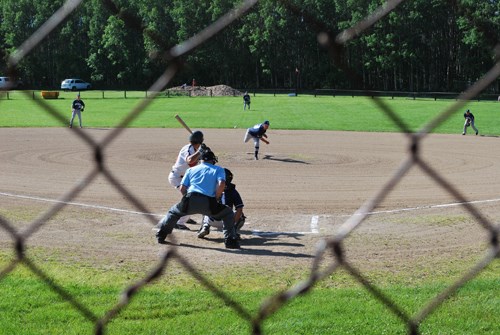Sometimes finding an umpire is harder than you think. Luckily in Carlyle, that is not the case.
More than five years ago, Bill Wyatt took on the role of organizing Carlyle umpires for minor ball. The level four umpire started umpiring 15 years ago. Umpiring about 65 games per year means that Wyatt has a lot of experience, and a number of games under his belt.
Wyatt sits on the minor ball organization board as a representative for the umpires. "Even in other towns, if I go to a league meeting or something, I mention to put someone on your board to be in charge of umpires. Because then you have people interested in it, and people working towards having people there. A coach doesn't want to be in the position where the game is about to start and they don't have an umpire."
Carlyle Minor Ball has between 10 and 12 umpires and is always looking for more that are interested. The organization makes it easy for those interested to get involved. Not only do they pay umpires $30 per game, but they also cover the costs of attending the clinic. "Level one is $35 for students and $40 for adults. But our minor ball organization pays for that. If you want to umpire within our organization, we'll cover that cost. You just register and we'll take care of it. And we actually pay for them to do that. If someone decides they want to go, we will pay them $50 to go and cover their registration fee."
Acting not only as the coordinator of umpires, Wyatt also acts as a mentor to the umpires within the organization. "If it's a kid's first game, I will usually go out there or I will have an adult out there. Or if the kid is doing the plate for the first time, I'll be doing the bases and then if there is any back-talk, you can kick it in the butt right away. We all meet before the games and talk about what games we are going to do and then we all go and do our games. After the game we all sit down, and have a little meeting afterwards, and talk about the games. There is a little area out there that we use, get ready and talk about things."
"It is hard getting people to go behind the plate sometimes. They [young umpires] all want to do the bases. But once they get on the plate and get behind there, and a game or two under their belt, they really like it there. Because lots of times that is where the game is at. You are right there."
"Baseball is zero tolerance, so if there are any issues, the umpires don't have to put up with it. But I know it is hard to say I don't need this, you are outta here. It is hard for them to do that, but once they get the confidence to do that, they'll never have any more problems."
"Confidence is big, even for myself. I go to some pretty high caliber baseball, like Western major league baseball. And the first few games, you have to be on your toes. Because those guys know the game and if you make a mistake, they let you know. So confidence is big and once you get your confidence, then you relax and there you go. Nobody wants to make a mistake. You know, nobody wants to be the outcome of the game. So there can be a lot of pressure, but it is fun. It really is."
Wyatt's recommendation for umpires does not only apply to the baseball diamond. "Don't lose your cool. Just stay calm because if you are calm, the person that is upset with you is calm. And if you are angry, then they are going to be angry as well. If you stay calm and just say this is the way I saw it, you will be fine."
For those interested in umpiring, Wyatt outlines the steps to become certified. "The first step is attending a level one clinic. And then if you want to go higher, there are different clinics you have to go to. There is level two, level three, level four and level five. Level one is the basics, level two is more of the rules and level three is more of the on-field information. In both level two and level three, there is a lot of classroom work."
"Level four is more of the practical application and that is when you qualify for nationals." Bill has just been selected for a national assignment which is an honour and aspiration of many umpires. He will be in Nanaimo, British Columbia, to use his skills at the Peewee National Playdowns in August.
If you are interested in taking an umpire clinic or want to get involved, feel free to contact Bill Wyatt with any questions you may have.



